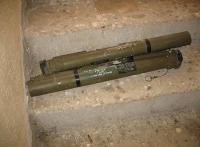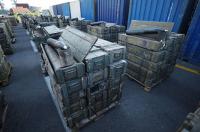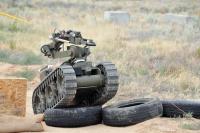-
Losing control: The dangers of killer robots
New technology could lead humans to relinquish control over decisions to use lethal force. As artificial intelligence advances, the possibility that machines could independently select and fire on targets is fast approaching. Fully autonomous weapons, also known as “killer robots,” are quickly moving from the realm of science fiction toward reality. While the process of creating international law is notoriously slow, countries can move quickly to address the threats of fully autonomous weapons. They should seize the opportunity presented by the Convention on Conventional Weapons review conference, to be held this December, because the alternative is unacceptable: Allowing technology to outpace diplomacy would produce dire and unparalleled humanitarian consequences.
-
-
Datacasting helps first responders with live video streaming via smartphone

When torrential storms caused widespread flooding in Houston, Texas, in mid-April, first responders needed a way securely to share information amongst their many organizations. Luckily the DHS S&T First Responders Group’s (FRG) datacasting system was available. Datacasting provides public safety users with the capability to transmit secure video and data over existing broadcast television signals to a targeted audience. Even in an emergency situation, where other wireless services often fail due to network congestion, datacasting still provides a reliable platform to quickly send large files.
-
-
Trump calls for profiling of Muslims, surveillance of mosques
Providing more details about his response to the Orlando shooting, Donald Trump on Sunday proposed the profiling of Muslims by law enforcement, and the nation-wide implementing of a Muslim surveillance programs which was used for a while by the NYPD, but which was discontinued after it had failed to yield a single useful lead.
-
-
Tracking, analyzing how ISIS recruits through social media

A team of researchers has developed a model to identify behavioral patterns among serious online groups of ISIS supporters that could provide cyber police and other anti-terror watchdogs a roadmap to their activity and indicators when conditions are ripe for the onset of real-world attacks. The researchers apply the laws of physics to study how terrorist support groups grow online, and how law enforcement can track activities.
-
-
FBI's approach to digital investigations puts security at risk: Expert
A cybersecurity expert argues that the FBI’s recent and widely publicized efforts to compel Apple Computer to write software to unlock an iPhone used by a terrorist in California reflects an outdated approach to law enforcement that threatens to weaken the security of all smartphones, potentially putting the private information of millions of smartphone users at risk and undermining the growing use of smartphones as trusted authenticators for accessing online information.
-
-
The accuracy of the FBI’s face-recognition technology may be improved: GAO
The Department of Justice’s (DOJ) Federal Bureau of Investigation (FBI) operates the Next Generation Identification-Interstate Photo System (NGI-IPS) — a face recognition service that allows law enforcement agencies to search a database of over thirty million photos to support criminal investigations. The GAO examined the FBI’s face recognition capabilities, and the extent to which the FBI’s use of face recognition adhered to privacy laws and policies, and the accuracy of these capabilities.
-
-
Former IDF general: Hezbollah could fire 1,200 rockets daily into Israel during next war

A former IDF general warned Israelis earlier this week that the next war with the Iran-backed Lebanese terror organization Hezbollah would lead to a barrage of rockets into Israel on an order of magnitude higher than anything Israel has yet faced. Major General (res.) Yitzhak Gershon said that the 2006 war between Israel and Hezbollah featured up to 160 rockets per day fired at Israel’s north. But given Hezbollah’s military buildup, “we need to expect up to 1,200 rockets in a day– it will be a completely different scenario from anything we’ve known.”
-
-
Labor MP killed near Leeds by gunman shouting “Britain First!”

Jo Cox, 41, a Labor MP for Batley and Spen, has been shot and stabbed to death Thursday by a man shouting “Britain First!” She was attacked outside a library in the town of Birstall, West Yorkshire. Cox has been campaigning for the United Kingdom to stay in the EU – the referendum on this question is to be held Thursday, 23 June. Britain First, founded in 2011, is a far-right political party campaigning against immigration, multiculturalism, and what it sees as the Islamization of Britain. Members of Britain First conduct what they call “Christian patrols” outside of mosques and the homes of Muslim leaders.
-
-
The Orlando shooting: exploring the link between hate crimes and terrorism

Some are calling the mass shooting at an Orlando gay nightclub an act of terrorism. Others are calling it a hate crime against the LGBT community. President Obama declared it an “act of terror and an act of hate.” Can it be both? The Orlando tragedy demonstrates the importance of exploring difficult questions. For example, are terrorists who commit acts of hate and terrorists who target the government radicalized the same way? Are perpetrators motivated by far-right extremist views similar to those motivated by jihadist extremism? What factors helped push these perpetrators to violence, and what steps can be taken to stop it from occurring again? Answering these questions may help law enforcement identify, investigate, prosecute, and ideally thwart those who seek to turn to violence to achieve their goals.
-
-
Report: Hezbollah has more rockets than 27 NATO countries combined

Any future war between Israel and Hezbollah will take a devastating toll on civilians due to the Iran-backed terrorist group’s practice of embedding its military assets in residential areas, military analysts say. Hezbollah currently has a stockpile of over 130,000 rockets, more than the combined arsenal of all NATO countries, with the exception of the United States.
-
-
New mobile app offers a virtual tour of the Manhattan Project
A new, free mobile application titled “Los Alamos: The Secret City of the Manhattan Project,” is now available for download from the Apple store. The app allows users from any location around the world to experience the environment in that pivotal time during the Second World War when a group of scientists came to Project Y, the wartime-era code name for Los Alamos, to develop a weapon unlike any other in human history — a weapon to harness the power of the atom.
-
-
AR-15: The most popular assault-style rifle in the United States
The gunman who killed dozens of people in Aurora, Sandy Hook, San Bernardino, and, yesterday, Orlando all used an AR-15 rifle. According to the National Rifle Association (NRA), the gun, which was designed by ArmaLite for the U.S. Army and originally produced by Colt in the 1960s, is the most popular rifle in the United States. Between 5 and 8.2 million assault-style rifles are privately owned by U.S. citizens, and 3.3 million of those were AR-15.
-
-
Major mass-shooting attacks in the U.S. since January 2009

Between 2008 and 2013, the FBI used a narrow definition of mass shootings – limiting the designation “mass shootings” to incidents in which an individual “kills four or more people in a single incident… typically in a single location.” In 2013 the FBI changed its definition, moving away from “mass shootings” to identifying an “active shooter” as “an individual actively engaged in killing or attempting to kill people in a confined and populated area.” The FBI designated the incidents listed below as mass-shooting incidents.
-
-
Six things Americans should know about mass shootings

The United States had 78 mass shootings during that 30-year period. The highest number of mass shootings experienced outside the United States was in Germany – where seven shootings occurred. In the other twenty-four industrialized countries taken together, 41 mass shootings took place. In other words, the United States had nearly double the number of mass shootings than all other twenty-four industrialized countries combined in the same 30-year period.
-
-
Hazardous-devices teams compete at the Robot Rodeo, 14-17 June

Hazardous-devices teams from around the Southwest will wrangle their bomb-squad robots at the tenth annual Robot Rodeo beginning Tuesday, 14 June, at Los Alamos National Laboratory. “The Robot Rodeo gives bomb-squad teams the opportunity to practice and hone their skills in a lively but low-risk setting,” said a member of the Laboratory’s hazardous-devices team.
-
More headlines
The long view
Factories First: Winning the Drone War Before It Starts
Wars are won by factories before they are won on the battlefield,Martin C. Feldmann writes, noting that the United States lacks the manufacturing depth for the coming drone age. Rectifying this situation “will take far more than procurement tweaks,” Feldmann writes. “It demands a national-level, wartime-scale industrial mobilization.”
How Male Grievance Fuels Radicalization and Extremist Violence
By Haily Tran
Social extremism is evolving in reach and form. While traditional racial supremacy ideologies remain, contemporary movements are now often fueled by something more personal and emotionally resonant: male grievance.
The Surprising Reasons Floods and Other Disasters Are Deadlier at Night
By Kate Yoder
It’s not just that it’s dark and people are asleep. Urban sprawl, confirmation bias, and other factors can play a role.
Why Flash Flood Warnings Will Continue to Go Unheeded
By Rebecca Egan McCarthy
Experts say local education and community support are key to conveying risk.
